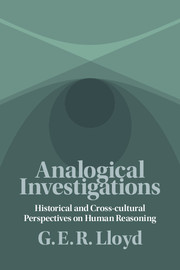Book contents
- Frontmatter
- Contents
- List of diagrams
- Introduction
- 1 On the very possibility of mutual intelligibility
- 2 The multiple valences of comparatism
- 3 Analogies, images and models in ethics: some first-order and second-order observations on their use and evaluation in ancient Greece and China
- 4 Analogies as heuristic
- 5 Ontologies revisited
- 6 Conclusions
- Glossary of Chinese terms
- Notes on editions
- Bibliography
- Index
1 - On the very possibility of mutual intelligibility
Published online by Cambridge University Press: 05 September 2015
- Frontmatter
- Contents
- List of diagrams
- Introduction
- 1 On the very possibility of mutual intelligibility
- 2 The multiple valences of comparatism
- 3 Analogies, images and models in ethics: some first-order and second-order observations on their use and evaluation in ancient Greece and China
- 4 Analogies as heuristic
- 5 Ontologies revisited
- 6 Conclusions
- Glossary of Chinese terms
- Notes on editions
- Bibliography
- Index
Summary
My opening study poses the basic issue that any attempt at cross-cultural exploration faces, namely how, and how far, mutual understanding is possible, an issue of some urgency when we encounter what at first sight appear to be radically counter-intuitive beliefs. I shall begin by offering some reminders of the difficulties that even those who speak the same natural language encounter, before turning to the far more severe problems raised both by the ethnographic data and by ancient history. In the former case I shall propose some preliminary comments on recent anthropological debate, especially with regard to Descola's ontological schemata and Viveiros de Castro's perspectivism. In the latter my examination of the explicit arguments for which we have evidence especially, though not exclusively, from ancient Greece, will prompt me to suggest where we need to be wary of several of our own basic presuppositions. These concern the concept of nature, for example, and the view that if we do not adhere to a realist account we are thereby committed to a form of relativism that precludes mutual intelligibility. My controversial suggestion, where nature is concerned, is that it is itself a cultural artefact. On the second question, I argue that we can avoid that fateful dichotomy (realism/relativism) by factoring in the multidimensionality of reality. The upshot is not, of course, some way of guaranteeing success in understanding, but to remove some of the obstacles felt to stand in its way and to see some of the difficulties that undeniably remain as challenges to us to improve our understanding rather than as evidence that this cannot be done. The relevance of this to my study of analogies is, of course, that mutual intelligibility is necessary if comparison is to be possible.
Like the ethnographer, the student of ancient societies is faced with a recurrent problem of translation, and in one important respect suffers from an obvious considerable disadvantage. Modern ethnographers can question members of the groups they study to get some reaction on the question of whether or how well they have understood them, though the quality of the response will reflect the relationship the ethnographer has been able to build up. He or she may be told, simply out of politeness, how brilliantly he or she has grasped the meaning of their words and of their actions. The ancient historian is just confronted by documents and texts, those that have survived the vagaries of transmission and mostly now buried beneath a pile of earlier interpretations.
In both cases we have to be realistic about the level of understanding that can be achieved. But we have also to be realistic about the level of understanding attainable even when the conditions are optimal, when we are dealing with someone who shares with us the same natural language, maybe also the same upbringing and environment. The particular problems of trying to grasp the meaning of some ancient text in a foreign language, or the work of an author as a whole, are mirrored, even if less severely, in our efforts to understand some writing in English. What is it to say that we have grasped the meaning of King Lear, let alone of Shakespeare as a whole, or, to come down to today, of Salman Rushdie or A. S. Byatt? To state the obvious, it is never the question of ‘the’ meaning, just the one, but usually of multiple meanings. The point is familiar from religious hermeneutics, and although in that context we may sometimes suspect deliberate mystification, the lesson that readings are open-ended is surely obvious across the board: not even scientific communications are immune to multiple interpretations.
- Type
- Chapter
- Information
- Analogical InvestigationsHistorical and Cross-Cultural Perspectives on Human Reasoning, pp. 10 - 28Publisher: Cambridge University PressPrint publication year: 2015



